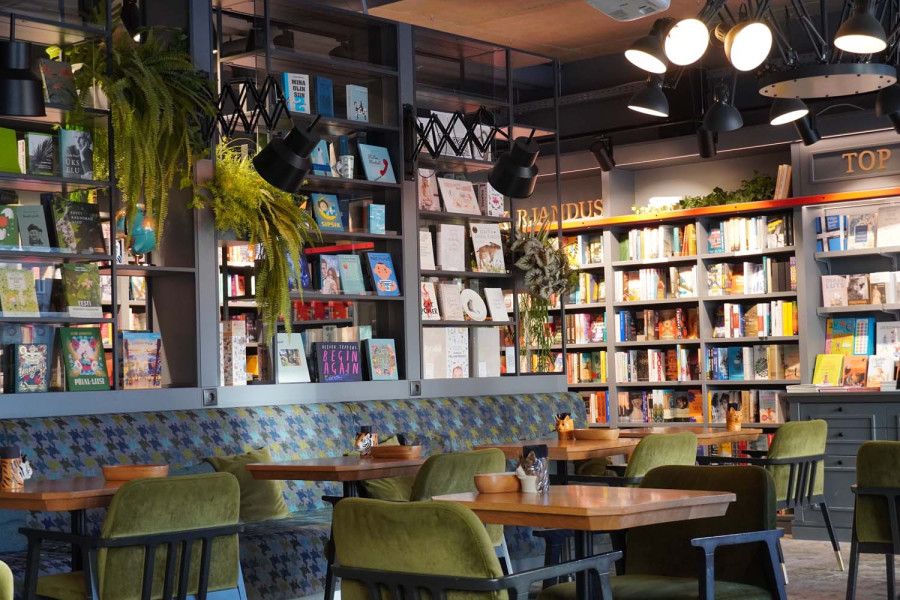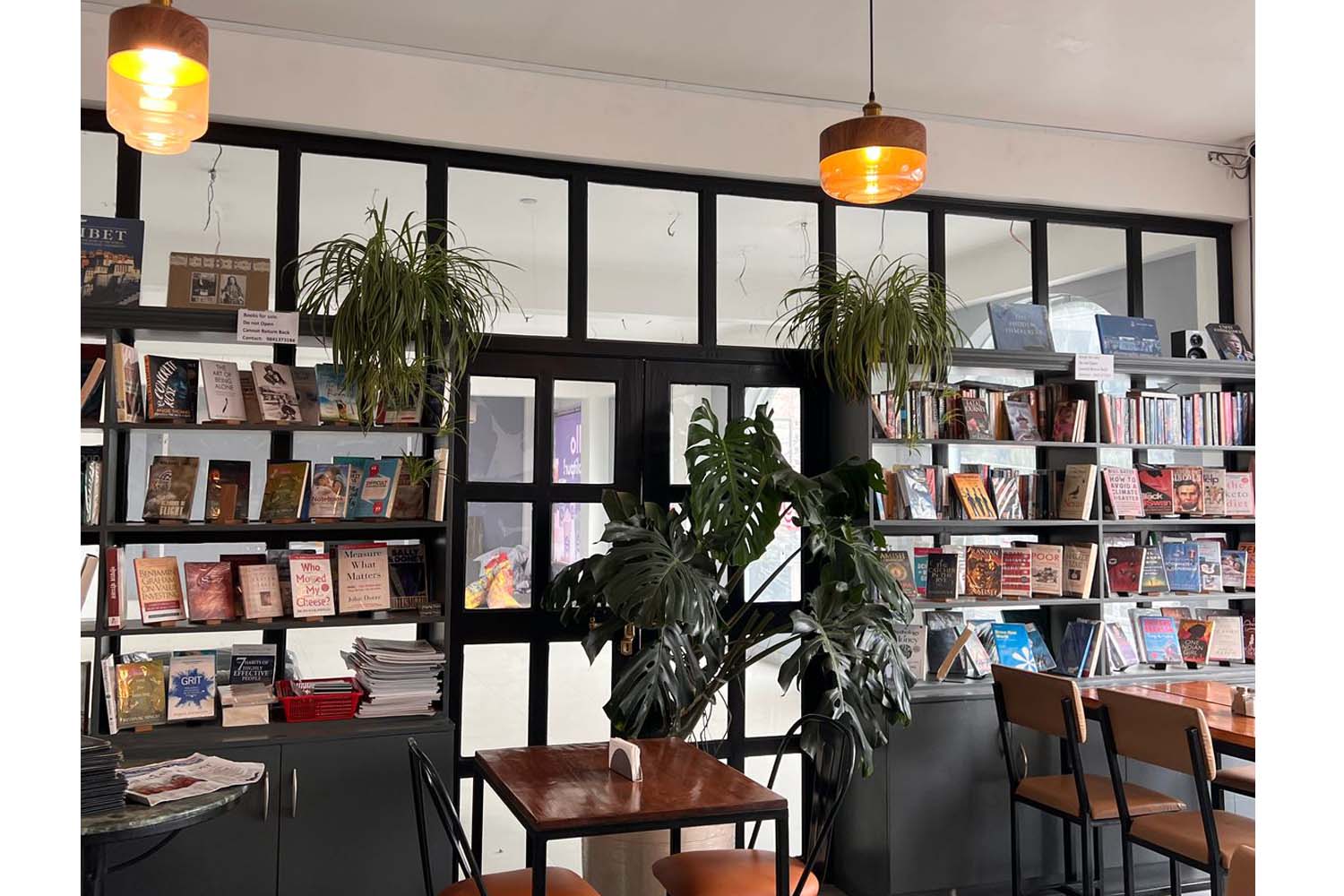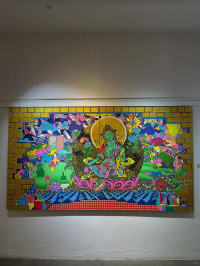Culture & Lifestyle
Quiet spaces and costly cups
Book cafes are popular for their peaceful vibes and Instagram-worthy interiors, but some question their affordability and whether these spaces support reading culture.
Reeva Khanal
The book cafe culture has been steadily growing across the Kathmandu Valley, offering cosy spaces for readers, creatives, and remote workers seeking a quiet escape from the bustle of city life. With a cup of coffee and soft music playing in the background, visitors settle into their rhythm, mixing relaxation with reflection and enjoying their drinks and thoughts.
Sushmita Baniya, 21, shares her experience with book cafes in Kathmandu, highlighting Ujamaa Koffie & Bakery with Library as her favourite. She values the cafe’s calm and focused environment, with a dedicated reading room that prioritises reading over other distractions, making it a perfect place for bibliophiles. However, she notes that many book cafes, particularly Bodhi Books and Bakes, tend to be expensive, making them less accessible to those from different economic backgrounds. She suggests that more affordable options could help expand the appeal of book cafes and encourage broader reading culture.
She believes that the growing popularity of book cafes in Kathmandu can be attributed to the rise of remote work and freelancing, making them attractive alternative workspaces. Furthermore, social media promotes these cafes, as people enjoy sharing aesthetically pleasing locations. “I would also love to see more vintage and rare books in these cafes, which would enrich the experience,” she adds.
Baniya believes that book cafes are helping to build a stronger reading community in Kathmandu. “Many host book launches, literary discussions, and poetry readings, fostering a sense of community among book lovers,” she says.
Similarly, Suravi Poudel, 19, shares her thoughts on book cafes in Kathmandu, mentioning Ektafe Brew Manor and Books Mandala Cafe and highlighting the former as her favourite. However, she points out that book cafes are generally not affordable, particularly for students or locals, as the target audience appears to be foreigners and higher-class working individuals. “I don’t think a student or any local can visit it often without being tense about the pricing,” she notes.
For Poudel, the ideal book cafe would have a “quiet but pleasingly calm environment,” with perhaps a little instrumental music in the background, cosy vibes, yellow lighting, and a fresh feel, something Ektafe Brew Manor matches to a certain extent. She believes the growing popularity of book cafes can be attributed to their aesthetics, especially with the influence of social media.
Ravi Pandey, a student, shared that he prefers his college library over book cafes because libraries offer fewer distractions. He is doubtful whether book cafes foster a reading culture, as many people seem more focused on aesthetics, often holding books merely for the sake of photos. Ravi believes book cafes could work well for working individuals, but for young people, spaces like The 100 Spaces are ideal, as they provide platforms for young minds to engage and spend their time productively.
Aakriti Bharati, 23, shares her love for book cafes in Kathmandu, naming Bodhi Books and Bakes, Books Mandala, Kaidako Coffee House, and Himalayan Java as some of her go-to spots. While Himalayan Java is not technically a book cafe, she appreciates that it allows readers to buy books and read in a cosy environment.
When asked about the affordability of these cafes, Bharati notes that they are “difficult to afford”. She feels such cafes are geared more towards a specific economic background, with prices that make frequent visits difficult for students.
She also highlighted the growing coffee culture in Nepal, noting that many people, especially those working remotely, prefer such cafes as an alternative to working from home. “People can’t always work from home in their pyjamas. They need to feel like they are in an office setting,” she explains. Having recently developed a deeper interest in books to reduce screen time, Bharati feels that the book cafe trend aligns with a broader shift in people’s habits. “More and more people are getting into books. Some are even bored with their course materials and come to book cafes for a break,” she adds. This increasing engagement with books, she believes, is part of a wider trend of people seeking meaningful experiences and fewer digital distractions.
“If book cafes could offer more affordable coffee options catering to the country’s economic reality, it would make these spaces more accessible,” she suggests.
Lagan Tamrakar, co-owner of Soma Cafe, shares that the concept of combining a cafe with books initially came from his partner, Bishal Gurung. They envisioned a cafe with books, not a library, but a bookstore. In 2010, they opened the cafe and partnered with United Books, providing books for customers who prefer reading physical copies rather than digital.
The cafe, which has another branch in Baluwatar, serves food and drinks, with books as an added attraction. Tamrakar notes that there is a growing interest in self-help books, especially those on making money and personal growth, reflecting the entrepreneurial spirit of today’s readers.

Lilaram Khadka, 35, founder of Ujjama Koffie and Bakery with Library, reflects on his journey since starting the cafe four years ago. The cafe has become a hub for creative expression, hosting open mic sessions, poetry readings, and book-related events.
He believes the cafe is affordable for people from all backgrounds, emphasising that there is no obligation to order food or drinks. Visitors can simply come, relax, engage in conversations, or study in groups, exchanging ideas. For those who stay longer, Ujjama also offers Jiri tea, connecting Khadka to his hometown and showcasing its beauty through photographs displayed in the cafe.
Khadka reflects on the impact of the Covid pandemic, which inspired him to create a space where people could gather after being confined to their homes. He aimed to support students, particularly those from Jiri, by offering a conducive environment for study while also providing coffee shop training that could help them earn an income and work independently.
Khadka acknowledges challenges with book management, having lost about 300-400 books, and plans to strengthen the cafe’s organisational system.
Bodhi Books and Bakes has been around for over nine years, with Bipinti Pradhan, 34, managing it since the beginning. She said the idea for the book cafe came from the owners’ experience in New York, where it was common to find places that combined a bakery, coffee, and books.
Pradhan acknowledges that the cafe might be expensive for students and more suited for working individuals. She also mentions that the growth of the remote work culture has led to more people visiting the cafe. Still, Bodhi Books and Bakes face financial difficulties due to economic challenges. Despite managing to keep the business running during the Covid pandemic, the cafe is encountering new challenges.
All in all, book cafes in Kathmandu are gaining popularity as more people seek peaceful spaces to read, work, and connect. Though they offer a quiet escape from the fast-paced digital world, their affordability and support for reading culture remain a question–with many visiting these spaces just to click aesthetic photos.




 14.24°C Kathmandu
14.24°C Kathmandu



.jpg&w=200&height=120)











